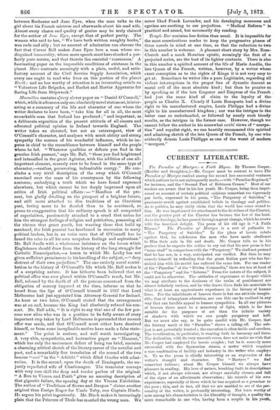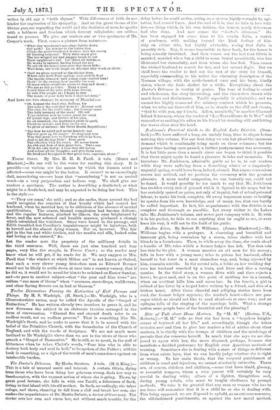CURRENT LITERATURE.
The Paradise of Martyrs : a Faith Rhyne. By Thomas Cooper.. (Hodder and Stoughton.)—Mr. Cooper must be content to have They Paradise of Martyrs ranked among the second less successful ventures which authors have not unfrequently made,—with "Paradise Regained," for instance, and the "Second Part of Robinson Crusoe." Most of our- readers are aware that in his hot youth Mr. Cooper, being then impri- soned on account of certain political opinions somewhat too vigorously put forth, expressed in his poem, The Purgatory of Suicides," a passionate revolt against established beliefs in theology and politics. As to polities, he may fairly claim that the world has come round to- him. He was imprisoned for attachment to the doctrines of the Charter, and the greater part of the Charter has become the law of the land. As to the theology, he has passed through a great change, which he avows with the heartiest delight. The poem of his old age is "A Faith Rhyme." The Paradise of Martyrs is a sort of palinodia to " The Purgatory of Suicides." In the place of heroic rebels against God, he celebrates the men who have made obedience to Him their rule in life and death. Mr. Cooper tolls us in his. preface that he expects the critics to cry out that his new poem is but "tame stuff" in comparison with the "Purgatory." We shall not pretend that be has not, in a way, anticipated our verdiet. But then he may console himself by reflecting that the great Italian poet who has fur- nished him with his model has suffered the same fate. For one reader of the "Paradise" of the "Divine Commedia," there are ten at least of the "Purgatory" and the "Inferno." From the nature of the subject, it could not be otherwise. The attitudes of repentance or despair which we may attribute to the denizens of the realm of punishment are- almost infinitely various, and he who draws them Ends his materials in what is at least an approximate experience in the history of human lives. For the inhabitants of, heaven there is but one attitude imagin- able, that of triumphant adoration, nor can this one be realised in any way that can forcible appeal to human sympathies. In all our pictures- of heaven there must be a monotony of light, which is far lass- suitable for the purposes of art than the infinite variety of shadows with which we can people purgatory and hell. But we must also say, to be quite candid with Mr. Cooper, that the literary merit of the "Paradise" shows a falling-off. The sub- ject is not powerfully treated ; the execution is often feeble and careless. The versification, in particular, is wanting both in harmony and force. The dedication, with its very uncouth verse, does not make us wish that Mr. Cooper had employed the heroic couplet ; but he is scarcely more successful with the Spenserian stanza, a metre which requires a rare combination of facility and industry in the *liter who emploks it. To us the poem is chiefly interesting as an expression of the writer's thought and character. The "Martyrs" we find somewhat tedious ; about Mr. Cooper himself we always hare pleasure in reading. His love of nature, br,aking forth in descriptions which, if not always relevant, are always carefully chosen, and full of the signs of an affectionate observation ; his records of his own experiences, especially of those which ho has acquired as a preacher to- the poor ; this, and in fact, all that we are enabled to see of the per- sonality of the writer, is profoundly interesting. Not least worthy of note among his characteristics is the liberality of thought, a quality the- more remarkable in one -who, having been a sceptic in his youth,
writes in old age a "faith rhyme." Wide differences of faith do not hinder the expression of his sympathy. And on the great theme of the Divine purpose regarding the world and the destinies of man, he speaks with a boldness and freedom which fervent religionists are seldom found to possess. We give our readers one or two specimens of Mr. Cooper's work. First, comes a picture front nature :—
"What tiny woodman's axe rings lightly down Our path? Lo, yonder to the rotten tree Clings the green-feathered worker, with his crown Of burning crimson! With what saucy glee The bar-winged jay and magpie laugh to see
Their neighbour's toil. Let idlers all deride,—
He works in earnest, having found the key To unlock the insect treasures that there hide; Well done, fair bird! laugh on, whether they work or chide.
" Shall we press onward to the thicket dern, 'Where rare herb Paris springs, and orchids flout
The mystic stranger. 'mid young suak,.-curled fern?
Hark! in the swamp, how merrily the rout Of snow-white crowfoots seems to sing and shout : 'We are as fair as blies.' Many a year, Loved lilies of the vale, with hope devout,
In vain I've sought ye; I begin to fear
The music of your fairy bells I shall not hear."
And here are two stanzas in memory of Mazzini
"Oh, honour the dead clay, Italians, for
The sake o' the soul that wore it! Honour well The clay, for the soul's sake ; but homage more The lofty memory of the man! Oft tell Your children how he toiled, amid the swell Of tyrant rage, and failure of his plan, So oft renewed, the Austrian's pride to quell, Freedom restore, and Italy in the van To place of nations; the Great Realm Republican !
"Say bow he toiled and never fainted; nor His toil gave up till death! So deep and true Was that great love to Freedom which he bore, And to his darling Italy! Ever grew The affection with his years. He never knew An ebb and flow of that great love. 'Twas one
With his own being: a love that did imbue And colour all his thoughts, and give them tone;
He lived and breathed in that great love, supreme, alone !"



































 Previous page
Previous page